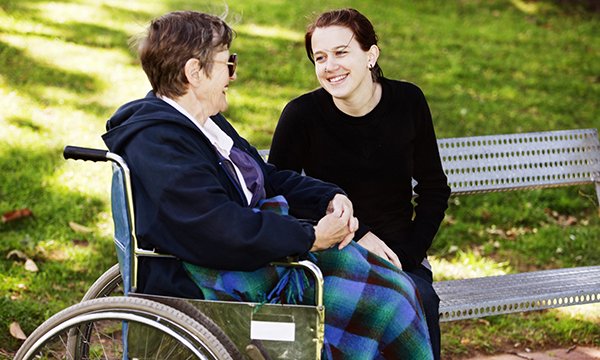Highlight nurses who show commitment to carers

The NHS could not survive without unpaid carers, says Jen Kenward. A carer and nurse, she is based at NHS England - the sponsor of a 2018 RCNi Nurse Award recognising nurses who are making carers’ lives easier

In May 2014 NHS England published its Commitment to Carers. It shouldn’t have been a big deal, but it was.
For the first time since its formation, the NHS had a plan focusing on how to provide support for the health and wellbeing of unpaid carers – a plan that recognised that without the input of carers, the NHS and care services could not be sustained.
About 5.5 million people in England are unpaid carers, supporting a friend or family member who is ill, frail, disabled or has mental health or addiction problems. A total of 1.4 million carers in England care for more than 50 hours a week, yet 20% of them do not have access to any support. Many carers struggle to make ends meet and experience health problems and social isolation as a result of their role.
Better support
My own caring experience (aside from my paid nursing role) started just over 10 years ago, when I began to provide extra support to my father, who had vascular dementia.
Alongside my mother, I was able to care for him at home until the end of his life. He had a brilliant team of doctors, nurses and other professionals who supported and treated him, but without mum and I, he would not have been able to die the way he wanted: at home, listening to jazz music, with his family close by.
Since then I have become a carer for my mum, and also for my daughter, who has a long-term health condition.
Like so many others, being a carer is a big part of my life. Strangely though, supporting carers was not something we covered during my training as a nurse, or in any of my post-registration training and education. Fortunately this is changing, and nurses are doing more and more to identify and support carers.
RCNi award
As nurses we are brilliantly-placed to identify the people who are important and play supporting roles to patients. We often meet people at their most vulnerable, and can develop relationships with them over time, which gives us insight into their lives and enables us to see and understand how their illness or disability affects their families.
The implementation of the Care Act and Children and Families Act in 2015 changed the legal rights of carers, giving them the same entitlement to assessment and support as the person they care for.
While the legal duty for carer assessments sits with local authorities, there is a ‘duty of cooperation’ for the NHS, and it is in delivering this duty that nurses can play a fundamental role.
Last year NHS England sponsored the inaugural RCNi Commitment to Carers award, to recognise nurses who go the extra mile to consider the needs of carers. The four finalists represented a diverse range of approaches and innovation and brought together their own lived experience with clinical expertise, compassion and insight.
For more on their stories, see the box below. We hope that reading about last year’s finalists will inspire you to share your work to improve the identification and support of unpaid carers.
Applications for this year’s awards can be submitted until 6 January 2017 by clicking here.
RCNi Commitment to Carers Award 2016 finalists
- Winner: Angela McDonald, child bereavement trainer, Salford Royal NHS Foundation Trust.
Feature: Training improves bereavement care for children and families
- Ann Cubbin, senior lecturer, Birmingham City University.
Feature: Workshops reduce stress for carers by equipping them with essential skills
- Pamela Kehoe, lead nurse for dementia, Tameside Hospital NHS Foundation Trust.
Feature: Initiatives protect bond between inpatients with dementia and carers
- Shelley Perry, clinical director, Breathe Therapies.
Feature: Invaluable support for families of people with eating disorders
About the author

Jen Kenward is experience of care lead, Community, Primary and Integrated Care at NHS England
References
UK Census (2011), Office for National Statistics’ Licensed Under the Open Government Licence.
Carers UK (2014) Facts about Carers. Policy Briefing, May 2014 (Carers UK).
Carers UK (2016) State of Caring 2016
